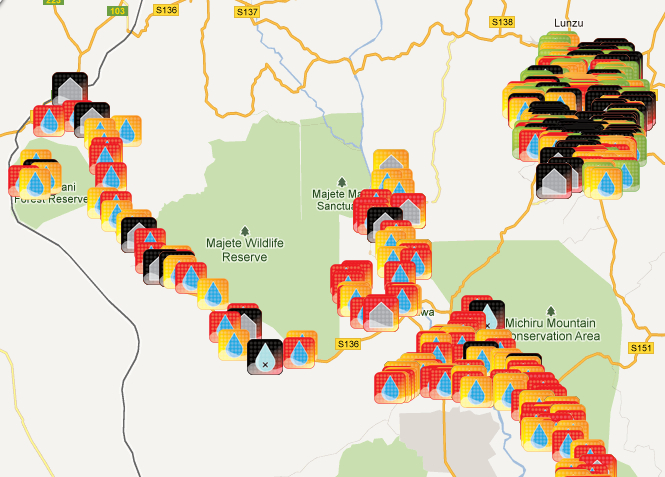Difference between revisions of "Increasing availability of water over space"
From Akvopedia
| (2 intermediate revisions by the same user not shown) | |||
| Line 1: | Line 1: | ||
| − | [[Image:water points.jpg|right|300px|Water points in Mozambique on a map, using [http://watermapmonitordev.appspot.com/ FLOW] cell phone software to create and monitor them. Map: Water for People.]] | + | [[Image:water points.jpg|thumb|right|300px|Water points in Mozambique on a map, using [http://watermapmonitordev.appspot.com/ FLOW] cell phone software to create and monitor them. Map: Water for People.]] |
| + | |||
Improving the availability of water over space is one of the technical measures to increase the [[Resilient WASH systems in drought-prone areas|resilience of WASH systems]], as more points of water in an area means better access for people and livestock. | Improving the availability of water over space is one of the technical measures to increase the [[Resilient WASH systems in drought-prone areas|resilience of WASH systems]], as more points of water in an area means better access for people and livestock. | ||
Different options are: | Different options are: | ||
| − | * Local recharge, retention/storage and re-use of water, which are increasingly being seen as the most important adaptations for ensuring water availability and food security to rural and urban populations, especially in developing countries in the face of climate change. | + | * Local [[Aquifer_recharge_-_general|recharge]], retention/storage and re-use of water, which are increasingly being seen as the most important adaptations for ensuring water availability and food security to rural and urban populations, especially in developing countries in the face of climate change. |
| − | * Various methods for gaining more water from rainwater and groundwater sources, some of which are innovative and need further research. | + | * Various methods for gaining more water from [[Rainwater_harvesting_-_general|rainwater]] and [[Groundwater_-_general|groundwater]] sources, some of which are innovative and need further research. |
* Methods on how to limit impact on existing saline groundwater and how to recharge/dilute it. | * Methods on how to limit impact on existing saline groundwater and how to recharge/dilute it. | ||
| − | * Methods to increase available water to communities through treatment of non-potable saline water. | + | * Methods to increase available water to communities through [[Desalination_/_Evaporation|treatment of non-potable saline water]]. |
| − | * Ways to improve | + | * Ways to improve [[handpumps]] sustainability since this affects water availability in many areas. |
Latest revision as of 22:07, 18 June 2012

Water points in Mozambique on a map, using FLOW cell phone software to create and monitor them. Map: Water for People.
Improving the availability of water over space is one of the technical measures to increase the resilience of WASH systems, as more points of water in an area means better access for people and livestock.
Different options are:
- Local recharge, retention/storage and re-use of water, which are increasingly being seen as the most important adaptations for ensuring water availability and food security to rural and urban populations, especially in developing countries in the face of climate change.
- Various methods for gaining more water from rainwater and groundwater sources, some of which are innovative and need further research.
- Methods on how to limit impact on existing saline groundwater and how to recharge/dilute it.
- Methods to increase available water to communities through treatment of non-potable saline water.
- Ways to improve handpumps sustainability since this affects water availability in many areas.
